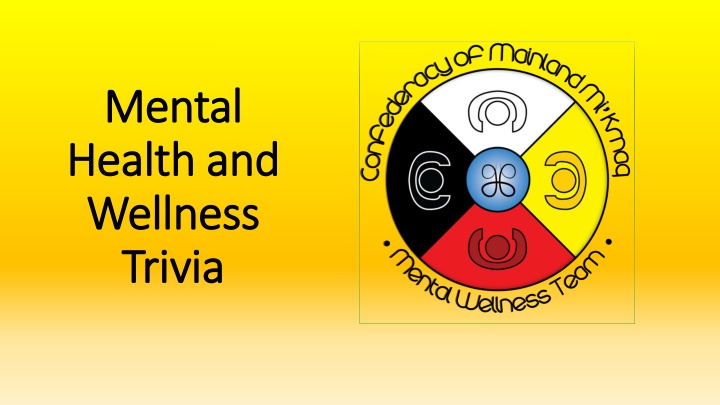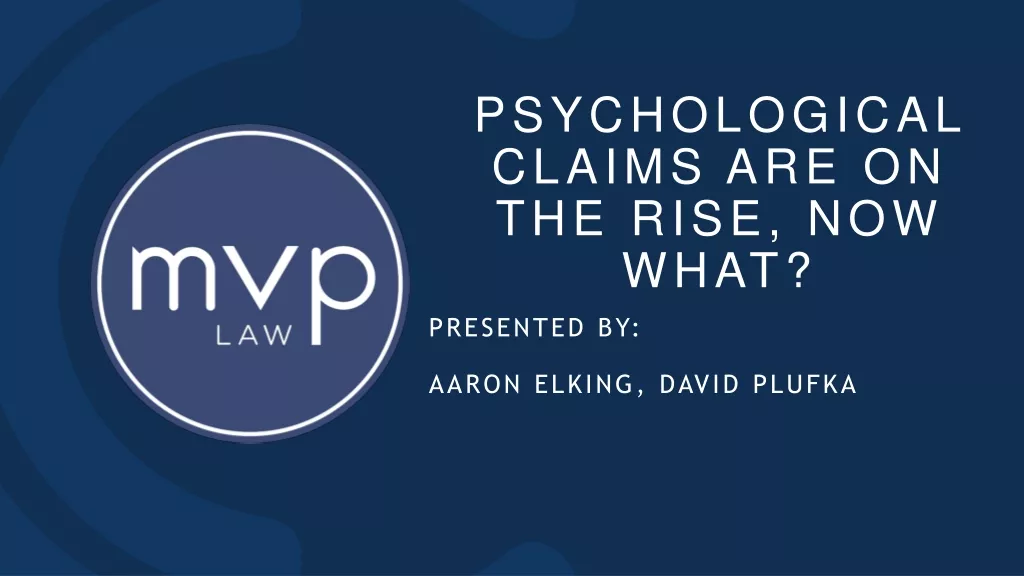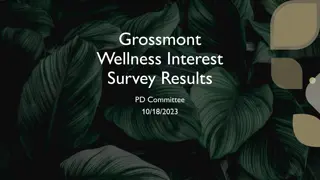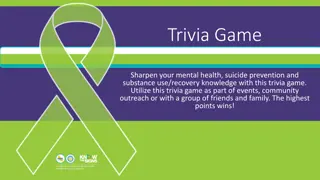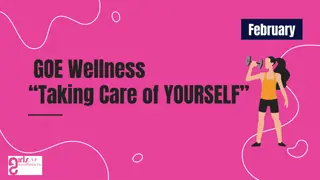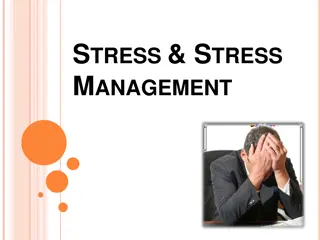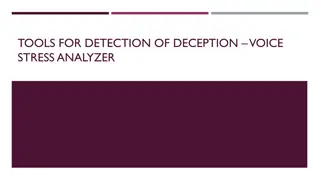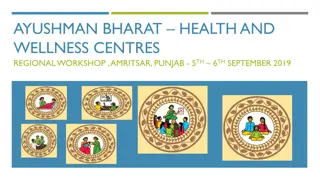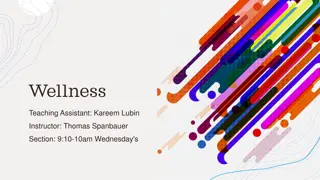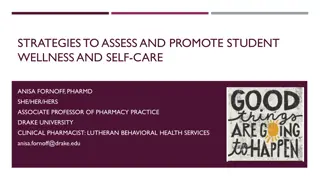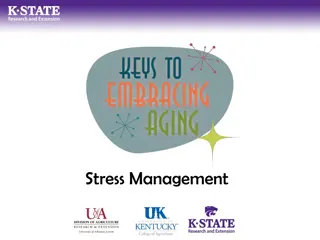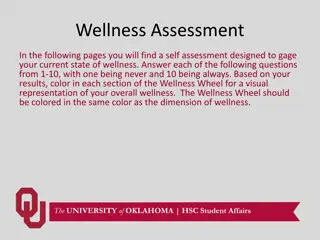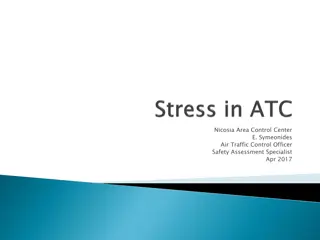Mental Health and Wellness Trivia: Understanding Stress, Self-Care, and Balance
Discover insights into stress, types of stress responses, mental health, self-care practices, areas of balance, and examples of spiritual self-care. Test your knowledge with fun trivia questions on well-being.
Download Presentation

Please find below an Image/Link to download the presentation.
The content on the website is provided AS IS for your information and personal use only. It may not be sold, licensed, or shared on other websites without obtaining consent from the author.If you encounter any issues during the download, it is possible that the publisher has removed the file from their server.
You are allowed to download the files provided on this website for personal or commercial use, subject to the condition that they are used lawfully. All files are the property of their respective owners.
The content on the website is provided AS IS for your information and personal use only. It may not be sold, licensed, or shared on other websites without obtaining consent from the author.
E N D
Presentation Transcript
Mental Mental Health and Health and Wellness Wellness Trivia Trivia
What is stress? A) The body s reaction to any change that requires a response B) The body s reaction with a physical, mental and/or emotional response. C) A normal part of life D) All the above D
What are the three main types of responses to stress? A) Fright, Flee, Fight B) Fright, Freeze, Fight C) Flight, Fight, Freeze D) Flight, Freeze, Run C
What is Mental health and wellness? A) Affects how we think, feel, and act, and helps us determine how we can handle stress B) The way your brain acts C) Not knowing your thoughts D) Knowing about physical illnesses A
What is Muin in English A) Mother B) Bear C) Moose D) Dog B
What is self-care: A) Taking care of other people B) Putting other people s needs before your own C) Putting your needs first and caring for yourself D) Taking care of your family C
What are the four areas of balance: What are the four areas of balance: A) Physical, Emotional, Spiritual, Mental B) Nature, Physical, People, Technology C) Physical, Mental, Spiritual, Nature D) Emotional, Social, Nature, Mental A
What are examples of Spiritual Self-Care activities? A) Eating healthy B) Sleeping 7-9 hours C) Participating in cultural activities D) Having Coffee with a friend C
What is Welalin in English A) Good Morning B) Hello C) Welcome D) Thank You D
What are examples of Mental Health Self- Care activities? A) Drinking lots of water B) Challenging your brain C) Prayer D) Smudging B
What are examples of Emotional Self-Care activities? A) Puzzles B) Playing sports C) Prayer D) Setting boundaries with people D
What are examples of Physical Self-Care activities? A) Hunting & Dancing B) Going to community events C) Surrounding yourself with positive people D) Smudging A
What is anxiety? A) A feeling and Survival instinct B) Natural response to stressful situations C) It is a feeling of fear and/or worry of what is about to come or what has happened D) All the above D
What is Kitpu in English A) Kitten B) Bear C) Eagle D) Caribu C
What does anxiety help us do? A) Avoid conflict B) Avoid danger and gives us a boost of adrenaline to solve problems C) Not worry about everyday life D) All of the above B
In Canada Anxiety ranks in the top five most common mental illnesses In Canada Anxiety ranks in the top five most common mental illnesses in Canada. Out of five what rank is Anxiety? in Canada. Out of five what rank is Anxiety? A) 1: the most common mental illness B) 2: the second most common mental illness C) 3: the third most common mental illness D) 4: the fourth most common mental illness A
What makes anxiety a disorder? A) It does NOT start impacting everyday activities that we should enjoy. B) Preventing someone from living in balance C) Things such as panic attacks are getting better D) all of the above B
What does a panic attack resemble? A) A heart attack B) Uncontrolled breathing C) Isolation D) none of the above A
What is Kwe in English A) Eagle B) Bye C) Sorry D) Hello D
How many different types of Anxiety Disorders are there? B Agoraphobia Body Focused Repetitive Behaviours Generalized Anxiety Disorder Health Anxiety Hoarding Disorder (HD) Obsessive-Compulsive Disorder Panic Disorder Post Traumatic Stress Disorder Separation Anxiety Social Anxiety Disorder Specific Phobia https://www.anxietycanada.com/learn-about-anxiety/anxiety-in- adults/?gclid=Cj0KCQjwy6T1BRDXARIsAIqCTXrpMCyK7QvUN4WPJdTNo96Wmc5H 6UivZ7YgSirMJ72T9cSIx482blEaAnmtEALw_wcB A) 6 B) 11 C) 8 D) 9
How many minutes of exercise a day can help with anxiety? A) 1 hour B) 30 mins-45mins C) 15 mins- 30mins D) 0 mins C
Which of the following can help with anxiety? Which of the following can help with anxiety? A) Exercise B) Mindfulness C) Breathing exercises D) All of the above D
1 out of ______ Canadians will experience an anxiety disorder in their lifetime. A) 20% B) 50% C) 25% D) 15% C
What is Teluisi in English A) How are you? B) My name is.. C) Talk to me D) What is this? B
What is panic disorder ? What is panic disorder ? A) A short time of intense fear with/or sudden panic attacks that reoccur B) General anxiety and worry C) Constant worry about past things or future events D) Fear of social situations A
What is Generalized Anxiety Disorder? What is Generalized Anxiety Disorder? A) increase anxiety around social situations B) Excessive anxiety and worry about things we cannot control for 6 months that prevents people from enjoying daily activities. C) An intense fear, such as spiders, heights or snakes D) An increase of panic B
What is a phobia disorder? What is a phobia disorder? A) An increase of panic B) An intense fear: Such as spiders, heights, certain sounds, weather. C) Fear of social situations D) An increase of worry surrounding past events or future events B
What is social anxiety disorder? What is social anxiety disorder? A) A phobia of people B) Intense worry surrounding people, places and things C)It is a fear of being humiliated or embarrassed in public where people often feel that they are being judged negatively. D) Worry about being alone C
What is Tiam in English A) Beaver B) Bear C) Moose D) Dog C
What is separation anxiety disorder? What is separation anxiety disorder? A) Excessive anxiety of being separated from home or from a parent or caregivers. B) Anxiety only children experience C) Intense worry about being in crowds or groups D) Fear of being in public places A
What is agoraphobia? What is agoraphobia? A) The fear of open spaces or going outside B) Not avoiding situations and places where they feel a panic attack could happen, such as malls. C) A& B are correct D) The fear of having a panic attack or symptoms in place where help may not be available, or become embarrassed or escape is difficult. D
What is self-esteem? A) Person s overall sense of self-worth or personal value. B) Does not play a part in your motivation and success throughout life C) Not being able to see all your abilities & weaknesses together D) All of the above A
What is assertiveness? A) Allows others to put their opinions above your own B) The ability to express your thoughts, beliefs, and opinions C) Aggressively pushing your opinions on other people D) Not being able to say no B
What is Katew in English A) Maple tree B) Beaver C) Eel D) Worm C
What are ways to boost self-esteem? A) Focusing on the positives and taking a social media break B) Being open to compliments and identifying your strengths and areas of opportunity C) Avoiding negative self-talk and expressing your values and beliefs without others influencing change D) All of the above D
What is mindfulness? What is mindfulness? A) Thoughts in our mind B) Being in the present, being aware of our thoughts and feelings in the moment. Brings us back to the present. C) Constantly thinking about past events and things in the future D) Having your mind full of thoughts, feeling, emotions B
Which of the following are grounding techniques? Which of the following are grounding techniques? A) Hand of senses: 5 see, 4 touch, 3 hear, 2 smell, 1 taste B) Laying on the ground C) A & B D) Avoiding what is making us anxious A
Tie Breaker List as many symptoms and signs of stress as you can
4 Types of Stress Symptoms Physical self: Aches & pains Constipations Rapid heart beat Frequent colds Eating to much/little Sleeping to much/little Nausea/ dizziness Lack of energy Spiritual self: Stopping cultural practices Isolation Sense of loneliness Nervous habits ( Ex: nail baiting, pacing) Procrastination Mental self: Troubles with memory Difficulty concentrating Anxious thoughts Constant worry Negative thoughts Loss of humor Emotional self: Unable to relax Moodiness Irritable/ angry Unhappiness Feeling overwhelmed Crying
